Photographs: Reuters Leslie DMonte in Mumbai
He's hardly 15 weeks into his new job as executive vice-president of the applications and business process outsourcing (BPO) division of Dell Services in India, but Suresh Vaswani exudes confidence when talking about his new assignment.
Vaswani - also chairman of Dell India - has to build next-generation service offerings while simultaneously growing Dell's process capabilities across multiple industry verticals and market segments.
"It's early days but you can already sense that the services thrust has become very important to Dell," he asserts.
It's a tall order. Dell, which, according to industry estimates, has a revenue of nearly $2 billion in India, has been historically perceived as a technology company.
...
Everything about Dell's BIG plans for India
Vaswani, however, is no stranger to the services business, having been co-CEO of Wipro's IT business and an executive director on the board of Wipro before taking up this new job.
The shift at Dell took place around three years back, when it announced the acquisition of Perot Systems (rechristened Dell Services) for $3.9 billion, and heralded the company's foray into the services arena which was dominated by rivals IBM and Hewlett Packard (HP).
Till then, the slightly over $60 billion company was primarily known for its personal computer (PC) and hardware prowess, besides being the poster boy for supply chain practices with its direct sales model.
This April, Dell India simply reinforced this thrust on services when it put Vaswani at the helm of affairs of a company that is working hard to convince clients that it's much more than a technology products company.
...
Everything about Dell's BIG plans for India
Image: The Dell facility in Sriperumbudur, Tamil Nadu.Photographs: Sreeram Selvaraj
"We have a leading position in the healthcare segment (because of Perot) and strong in the government and education verticals in the US. We also have a reasonable presence in banking, manufacturing and distribution," points out Vaswani, adding that "going forward, we will also sharpen our focus on applications and the business process outsourcing (BPO) space to give us a complete IT solutions' branding".
To achieve his objectives, the chairman of Dell India has a blueprint that spans across organic and inorganic (acquisitions) growth opportunities besides capitalising on Dell's "existing solutions for clients".
Inorganic growth, for instance, has been one of Dell's major strengths. In the last 12 years, it has made around 20 acquisitions - eight of which were done in the last two years. The names include Perot, KACE Networks, Exanet, Boomi, Compellent, SecureWorks and Force10.
"These acquisitions have been done to acquire technology, and not for market share," adds Vikas Bhonsle, general manager, public & large enterprise business of Dell India.
...
Everything about Dell's BIG plans for India
Photographs: Bobby Yip/Reuters
"We will continue to look at acquisitions in specific verticals. These will include intellectual property or large captive centres of customers. We will do acquisitions to strengthen our presence, especially in applications and BPO. We are looking at India-based global organisations," adds Vaswani.
On the organic front, Dell itself "is a very large customer" for Vaswani's unit. However, Vaswani is not interested in playing the domestic BPO card.
"India is a strategic market for us, and one of the main reasons is that it is an evolving market for the services business. India also has a very good resource base for us in terms of talent. With a 23,000-member team, it has the second largest workforce of Dell outside the US. For our BPO business, India will continue as a delivery centre for global customers," explains Vaswani.
"Earlier, we had a lot of applications and BPO work in multiple places. These have been consolidated under one entity which has helped us enhance our internal delivery capabilities," says Vaswani who is also creating vertical business units such as healthcare (including consulting), manufacturing, retail, and commercial (including education and governments).
...
Everything about Dell's BIG plans for India
Photographs: Christina Hu/Reuters
Dell India has also created horizontal capabilities which include Application Development & Maintenance, Application Support, Packaging & Implementation, Business Intelligence and the Global Delivery Model.
"Future delivery models include software as a service and cloud computing," says Vaswani. Cloud computing, he explains, is the "cornerstone" of Dell's strategy. "We have heavily invested in cloud integration capabilities for large and mid-sized companies," he adds.
Strong point
Dell India's services thrust is complementary to its hardware business. "All our clients need technology solutions. And all our solutions are centred at our PC base, workstations, printing etc.," points out Mahesh Bhalla, executive director and general manager for consumer & small medium business (CSMB).
...
Everything about Dell's BIG plans for India
"We have a simple philosophy. Our strategy is based on capable, open and affordable solutions. We also have deep customer relationships. Over 80 per cent of our business comes directly from our customers," concurs Bhonsle, adding, "By open, we mean that we do not want to box our customers."
Bhonsle explains that Dell started in India around the year 2000, by leveraging its "global accounts". But today, it has channel programmes for small- and mid-sized businesses (SMBs) too.
"Cloud is the perfect fit for SMBs which are very cost-conscious," he adds. The mid-market, too, is a big focus area for Dell India. "Globally, Dell has a huge presence in the mid-market segment. This gives us additional leverage," adds Vaswani.
Meanwhile, Dell's strength in the PC business is apparent. It moved to the second spot in the worldwide personal computer market in the second quarter of 2011.
The company's rise was aided by improved sales in the Asia-Pacific region, according to a Gartner survey.
...
Everything about Dell's BIG plans for India
Photographs: Reuters
Dell moved to the second place in the worldwide PC market for the first time since the fourth quarter of 2008. The company did well in the Asia-Pacific region, where it had invested heavily lately, according to Gartner.
HP, though, continued to be the worldwide leader, accounting for 17.5 per cent of worldwide PC shipments in the second quarter of 2011.
However, the scene pans out differently in India. Multinational brands, according to Gartner, contributed more than half of the total PC shipments in the second quarter of 2011 with shipments from Acer, Dell, HP and Lenovo - the top 4 vendors - representing 50.4 per cent of the market.
However, Acer dethroned HP from the No. 2 position (12 per cent market share) in the market due to its strong commercial business. Dell, with 17 per cent market share, held on to its No.1 position.
"Dell is a leading player in the technology business in India. We are the No. 1 PC brand in the country in all segments - enterprises, SMBs and consumers. We want to continue this dominance, and grow in multiples of the market growth. For this, we will introduce new products, expand our retail reach, sales channel and partnerships. We will also bring customised products to India," asserts Vaswani.
...
Everything about Dell's BIG plans for India
Image: Computers packed into boxes are transported on a conveyor belt at a Dell factory in Sriperumbudur Taluk, in the Kancheepuram district of Tamil Nadu.Photographs: Babu/Reuters
Channel partners
Dell India pursues a multi-channel strategy. While it continues with its 'Dell-Direct' (including phone and online) model, it also has 40 distributors across the country to service local markets.
Moreover, there are around 50 Dell stores (exclusive) and multiple franchisee-operated ones which give consumers a "touch-and-feel" experience.
In addition, Dell India has regular programmes for its 1,000-odd affiliates that comprise mom-and-pop stores. Besides, students act as advisors, akin to LIC agents, and get a commission for the same.
Large-format stores like Croma have Dell kiosks that allow potential clients to custom-build their products after comparing them with competing products. "Add to this the social media component, and we have multiple touch points for our customers," notes Bhalla.
...
Everything about Dell's BIG plans for India
This February, Dell also floated a new business unit called the Global Commercial Channels (GCC) to dedicatedly work with its set of enterprise and SMB channels in India.
"Earlier, partners had to speak with different teams inside Dell depending on the customer they were addressing. Most commercial channel partners address customers across SMB, enterprise or government, and wanted a single point of contact irrespective of the customers they address. Keeping this in mind, we have floated the GCC team," says Bhalla.
Dell's 'PartnerDirect' programme will now be managed by the GCC team. Bhalla expressed confidence that the new initiative will help in quickly fulfilling partner requests on key commercial aspects like special pricing, price and product configuration, and deal registration.
...
Everything about Dell's BIG plans for India
Photographs: Reuters/Babu
Going forward
Over the last two years, Dell has seen success with its services play. Dell says the growth in its enterprise solutions and services segments, particularly in servers, storage, data management, security and cloud service, continued to drive the company's profitability in the fiscal second quarter as operating income rose significantly on a 1 per cent revenue increase.
Dell Services' (globally a 15,000-member team) revenue grew 6 per cent to $2 billion. Growth in countries outside of the US and Canada, Western Europe and Japan increased revenue by 14 per cent over the previous year and now account for 28 per cent of Dell's total revenue. Specifically, India and China were up 21 and 20 per cent, respectively.
"It's a misnomer that Indians like to buy cheap stuff. Rather, they focus on value," adds Bhalla, pointing out that "Dell India does not add freebies to its product offerings".
...
Everything about Dell's BIG plans for India
Second, its marketing communications (marcom) activities are "very product-centric", and instead of reducing costs it ensures that customers get "value".
"For instance," says Bhalla, "our laptops have a default HDMI cable (to connect to TVs). Also we offer complete cover (accidental damage protection) to lend more value to our products rather than offer freebies to promote them. These features set us apart."
Dell in India also has an "emotional connect" with the youth, according to Bhalla. "It's high-end, but not an unapproachable brand.
We have a slew of products aimed at the small office home office segment, gamers (acquired Alienware), XPS for the premium segment, and Vostro for SMBs (perhaps the only branded product for this segment)," he adds.
Analysts, too, are bullish on the prospects of Dell's foray into the services arena. "With an increased focus on services, Dell could soon become one of the top five IT companies in India," predict DataQuest analysts.
...
Everything about Dell's BIG plans for India
Photographs: Joshua Lott/Reuters
"Dell is number one in the PC space in the country. So it is in the servers and storage spaces. Thus, it has created a perception within the industry that Dell is capable - that they can replicate the success story in the services space. They have also been tapping the youth very aggressively with their campaigns," notes Sumanta Mukherjee, lead analyst for computing products, Cybermedia Research.
He adds, however, that "the going will not be very easy since the competition is strong in the services arena".
Alok Shende, principal analyst of Ascentius Consulting, has a similar view.
"At an aggregate level, the IT services market is fairly fragmented. However, at a segment level such as large enterprises segment or by large verticals such as telecom or banking, financial services and insurance, the markets are fairly concentrated by way of vendor market shares. The choices available to Dell to that extent are narrow. Dell is poised to do well in vertical markets where it has a priori leverage owing to its global strengths; for example, healthcare."
...
Everything about Dell's BIG plans for India
Photographs: Issei Kato/Reuters
On the other hand, when it comes to generic markets and services, Dell will have to show differentiation to gain market share.
This differentiation will not come from technology prowess alone; but also from areas such as global best practices that create value for customers.
"Dell will have to win deals with marquee customers so as to make it easy for other prospects to come on board. Price remains a strategic weapon to prise open competitive market opportunities," concludes Shende.

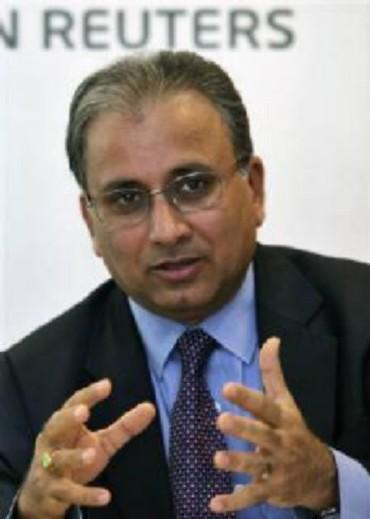

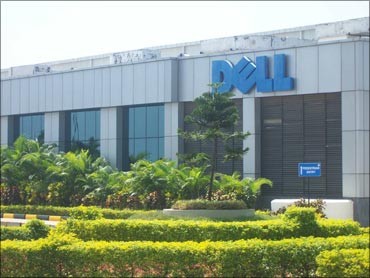
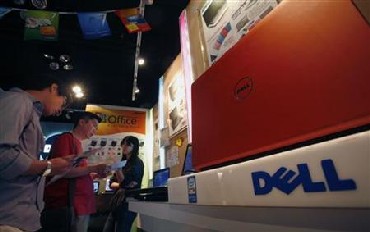
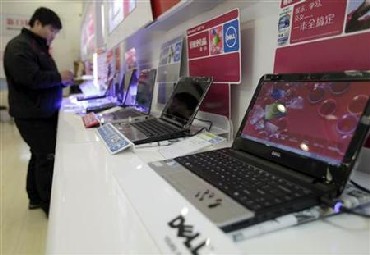


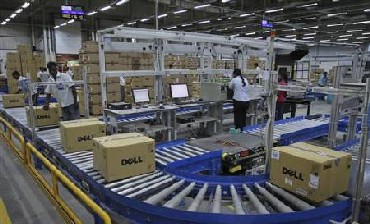
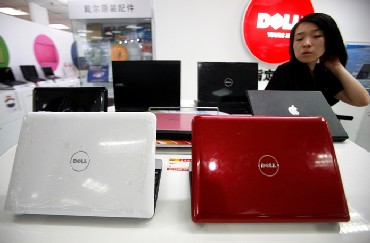

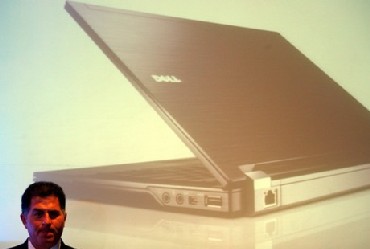
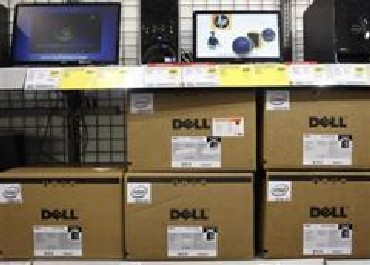


article